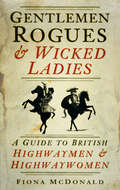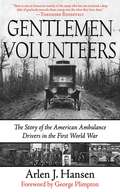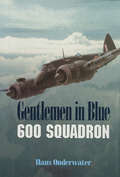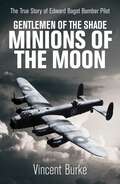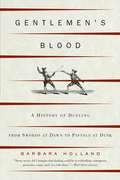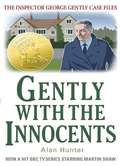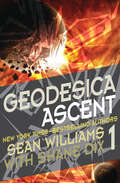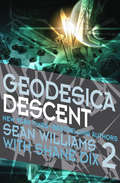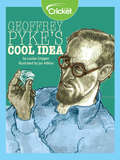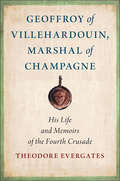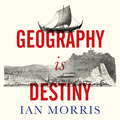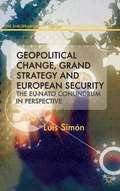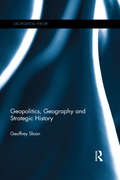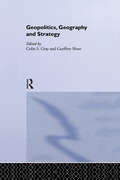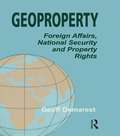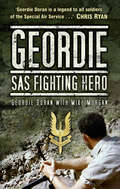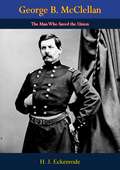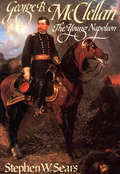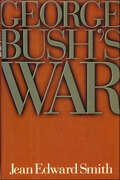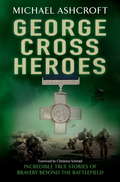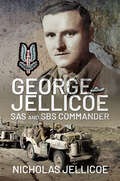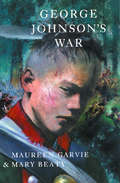- Table View
- List View
Gentlemen Rogues and Wicked Ladies: A Guide to British Highwaymen and Highwaywomen
by Fiona McDonaldEveryone loves a romantic rogue whose exciting exploits feature a cheeky disregard for the law, narrow escapes and lots of love interest. Even at the height of highway robbery activity in the eighteenth century, it was thought that the death penalty was too harsh for these wayward scoundrels. There was the ever-courteous Claude Duval, the epitome of gentlemanliness; the infamous Katherine Ferrers, who was the inspiration for the film The Wicked Lady; Dick Turpin, the most famous highwayman of them all; and lesser-known characters such as Tom Rowland, who dressed as a woman to avoid capture. All these and more form an entertaining volume that follows the mounted thief in their endless match against the law and a death by public hanging.
Gentlemen Volunteers: The Story of the American Ambulance Drivers in the First World War
by George Plimpton Arlen J. HansenThey left Harvard, Yale, Princeton, Michigan, and Stanford to drive ambulances on the French front, and on the killing fields of World War I they learned that war was no place for gentlemen. The tale of the American volunteer ambulance drivers of the First World War is one of gallantry amid gore; manners amid madness. Arlen J. Hansen's Gentlemen Volunteers brings to life the entire story of the men-and women-who formed the first ambulance corps, and who went on to redefine American culture. Some were to become legends-Ernest Hemingway, e. e. cummings, Malcolm Cowley, and Walt Disney-but all were part of a generation seeking something greater and grander than what they could find at home.The war in France beckoned them, promising glory, romance, and escape. Between 1914 and 1917 (when the United States officially entered the war), they volunteered by the thousands, abandoning college campuses and prep schools across the nation and leaving behind an America determined not to be drawn into a "European war." What the volunteers found in France was carnage on an unprecedented scale. Here is a spellbinding account of a remarkable time; the legacy of the ambulance drivers of WWI endures to this day.
Gentlemen in Blue: 600 Squadron
by Hans OnderwaterThis is the history of 600 City of London Squadron from when they formed in 1925 to their disbandment in 1957.
Gentlemen of the Shade - Minions of the Moon: The True Story of Edward Bagot Bomber Pilot
by Vincent Burke"From the skies over war-torn Europe to the opulent halls of English nobility, Edward Bagot's journey is a riveting testament to courage, heritage, and unwavering faith."Edward Bagot&’s memoir offers a unique personal perspective on World War II, combining his experiences as a Pathfinder pilot with his aristocratic heritage and deep religious convictions. Edward joined the Royal Australian Air Force (RAAF) during the latter part of the Second World War. He became a member of Bomber Command and a Pathfinder pilot. Intensely religious, Edward, who believed he had a premonition of his death, flew without fear, his faith sustaining him throughout his wartime experiences. His story is meticulously drawn from his diary, which he began at the age of fifteen, and the letters he sent to his family from England. Edward's wartime experiences, while reflective of many young Australians of his time, stand out due to his unique personal background and story. His heritage traced back to an aristocratic English family from the era of William the Conqueror, allowing him to spend his leave visiting his ancestral home and engaging in a remarkable social life among nobility and theatre celebrities in London's West End. Set against the relentless march toward war in Europe, Edward's narrative is one of patriotism and bravery. His personal accounts offer a unique perspective on the devastating yet transformative impact of the war, showcasing the fearlessness of young men like him who played crucial roles in shaping history.
Gentlemen's Blood: A History of Dueling From Swords at Dawn to Pistols at Dusk
by Barbara HollandA history of dueling in many countries from around the world. The author takes the reader through the different phases of the duel from insult to resolution and details the rise and decline in its popularity. Includes several recountings of famous duels.
Gently with the Innocents
by Alan HunterWhen an old man is found dead at the foot of the staircase in his rambling old house, a hint of murder and the lure of hidden treasure draw Gently into the case. Gently has plenty of suspects for the old man's murder. A warehouse watchman across the street misses nothing that goes on at the house, but can shed no light on the murderer. A local antiques dealer knows a suspicious amount about the house and a good deal more about the treasure that is thought to be hidden within its walls. When the murderer strikes again, Gently has a high profile case on his hands and faces a night of sheer terror alone in a house whose secret has claimed at least two lives . . .
Geodesica Ascent (Geodesica #1)
by Sean Williams Shane DixThe year is 2438. Humanity has migrated to the stars in discrete waves, driven by evolving technologies and new ways of being human. The far-flung Arc Systems struggle under the yoke of their newest rulers—Exarchs from Sol, whose monopoly on faster-than-light communication gives them absolute control of a growing interstellar empire.But humans weren&’t the first to conquer the stars, and the discovery of an alien artifact promising transport between systems threatens to undermine the Exarchs&’ power. Revolutionary leader Melilah Awad seeks an alliance to unlock Geodesica&’s secrets with VOIDship pilot Palmer Eogan, a lover she lost to the Dark more than two centuries earlier. What they find could be more dangerous than anyone--human or more than human--could imagine….
Geodesica Descent (Geodesica #2)
by Sean Williams Shane DixAn alien artifact&’s mysteries could spark humanity&’s collapse in the second novel of the Geodesica Duology from the New York Times–bestselling authors. Revolution spreads like wildfire through humanity&’s interstellar empire, sparked by the opening of Geodesica and the destruction of an entire inhabited system. But who was ultimately responsible? And who will pay the price? Melilah Awad and Palmer Eogan delve deeper into Geodesica&’s ancient alien labyrinth than anyone has ever dared, hoping to unravel its secrets before the hunter-killers from Earth bring them down. Former Exarch of Bedlam, Isaac Forge Deangelis, finds his grip on sanity slipping as his very reason for existing is ripped from him. While a rebel Exarch and Palmer Horsfall, grieving for her lost sister, form an alliance that might tear humanity&’s interstellar empire apart . . . Praise for the Geodesica Duology &“Splendid fun, brimming with heroes, villains, chicanery, neat imaginative details, some seriously cool space battles, and one of the most mind-twisting alien artifacts ever imagined.&” —Alastair Reynolds, award-winning author &“Williams and Dix have a flair for combining slam-bang adventures, intriguing characters and cutting-edge scientific and philosophical speculations, resulting in books that elevate your adrenaline and your intellect. This latest series is no exception to their reign.&” —Paul di Filippo, author of The Big Get-Even &“Williams and Dix are writing first-class MMPB space opera, chock full of what we&’ve come to hope for; antagonists, allies and alien artifacts in perfectly balanced doses.&” —Agony Column
Geoffrey Pyke's Cool Idea
by Louise GrippenWhy would Geoffrey Pyke propose a strange idea like building an aircraft carrier from a mixture of ice and wood pulp?
Geoffroy of Villehardouin, Marshal of Champagne: His Life and Memoirs of the Fourth Crusade (Medieval Societies, Religions, and Cultures)
by Theodore EvergatesGeoffroy of Villehardouin, Marshal of Champagne by Theodore Evergates traces the remarkable life of Geoffroy of Villehardouin (c. 1148–c. 1217) from his earliest years in Champagne through his last years in Greece after the crusade. The fourth son of a knight, Geoffroy became marshal of Champagne, principal negotiator in organizing the Fourth Crusade, chief of staff of the expedition to and conquest of Constantinople, garrison commander of Constantinople and, in his late fifties, field commander defending the Latin settlement in the Byzantine empire against invading Bulgarian armies and revolting Greek cities. Known for his diplomatic skills and rectitude, he served as the chief military advisor to Count Thibaut III of Champagne and later to Emperor Henry of Constantinople.Geoffroy is remarkable as well for dictating the earliest war memoir in medieval Europe, which is also the earliest prose narrative in Old French. Addressed to a home audience in Champagne, he described what he did, what he saw, and what he heard during his eight years on crusade and especially during the fraught period after the conquest of Constantinople. His memoir, The Book of the Conquest of Constantinople, furnishes a commander's retrospective account of the main events and inner workings of the crusade—the innumerable meetings and speeches, the conduct (not always commendable) of the barons, and the persistent discontent within the army—as well as a celebration of his own deeds as a diplomat and a military commander.
Geography Is Destiny: Britain and the World, a 10,000 Year History
by Ian MorrisGeography is Destiny tells the history of Britain and its changing relationships with Europe and the wider world, from its physical separation at the end of the Ice Age to the first flickers of a United Kingdom, struggles for the Atlantic, and rise of the Pacific Rim.Applying the latest archaeological evidence, Ian Morris explores how geography, migration, government and new technologies interacted to produce regional inequalities that still affect us today. He charts Britain's geopolitical fortunes over thousands of years, revealing its transformation from a European satellite into a state at the centre of global power, commerce, and culture. But as power and wealth shift from West to East, does Britain's future lie with Europe or the wider world?
Geopolitical Change, Grand Strategy and European Security: The EU–NATO Conundrum in Perspective (The European Union in International Affairs)
by Luis SimónExamining the interplay between geopolitics, the strategic priorities of Europe's most powerful nations, Britain, Germany and France, and the evolution of NATO and CSDP, this book unveils the mechanics of the tension between conflict and cooperation that lies at the heart of European security politics.
Geopolitics and the Great Powers in the 21st Century: Multipolarity and the Revolution in Strategic Perspective (Geopolitical Theory)
by C. Dale WaltonThis book argues that in the twenty-first century Eastern Eurasia will replace Europe as the theatre of decision in international affairs, and that this new geographic and cultural context will have a strong influence on the future of world affairs. For half a millennium, the great powers have practised what might be called ‘world politics’, yet during that time Europe, and small portions of the Near East and North Africa strategically vital to Europe, were the ‘centres of gravity’ in international politics. This book argues that the ‘unipolar moment’ of the post-Cold War era will not be replaced by a US-China ‘Cold War’, but rather by a long period of multipolarity in the twenty-first century. Examining the policy goals and possible military-political strategies of several powers, this study explains how Washington may play a key role in eastern Eurasian affairs if it can learn to operate in a very different political context. Dale Walton also considers the rapid pace of technological change and how it will impact on great power politics. Considering India, China, the US, Russia, Japan, and other countries as part of a multipolar system, he addresses the central questions that will drive US policy in the coming decades. Geopolitics and the Great Powers in the 21st Century will be of interest to students of international security, military history, geopolitics, and international relations.
Geopolitics, Geography and Strategic History (Geopolitical Theory)
by Geoffrey SloanThis volume examines geopolitics by looking at the interaction between geography, strategy and history. This book addresses three interrelated questions: why does the geographical scope of political objectives and subsequent strategy of states change? How do these changes occur? Over what period of time do these changes occur? The theories of Sir Halford Mackinder and Nicholas Spykman are examined in order to provide an analytical narrative for five case studies, four historical and one contemporary. Taken together they offer the prospect of converting descriptions of historical change into analytic explanations, thereby highlighting the importance of a number of commonly overlooked variables. In addition, the case studies will illuminate the challenges that states face when attempting to change the scope of their foreign policy and geo-strategy in response to shifts in the geopolitical reality. This book breaks new ground in seeking to provide a way to understand why and how the geographical scope of political objectives and subsequent strategy both expands and contracts. This book will be of much interest to students of geopolitics, strategic studies, military history, and international relations.
Geopolitics, Geography and Strategy
by Colin S. Gray Geoffrey SloanGeopolitical conditions influence all strategic behaviour - even when cooperation among different kinds of military power is expected as the norm, action has to be planned and executed in specific physical environments. The geographical world cannot be avoided, and it happens to be 'organized' into land, sea, air and space - and possibly the electromagnetic spectrum including 'cyberspace'. Although the meaning of geography for strategy is a perpetual historical theme, explicit theory on the subject is only one hundred years old. Ideas about the implication of geographical, especially spatial, relationships for political power - which is to say 'geopolitics'- flourished early in the twentieth century.Divided into theory and practice sections, this volume covers the big names such as Mackinder, Mahan and Haushofer, as well as looking back at the vital influence of weather and geography on naval power in the long age of sail (sixteenth to nineteenth centuries). It also looks forward to the consequences of the revival of geopolitics in post-Soviet Russia and the new space-based field of "astropolitics".
Geoproperty: Foreign Affairs, National Security and Property Rights
by Geoff DemarestSome innovations create new strategic property and new conflicts. Demarest argues that we have not reached the end of history and modern man will continue to fight over property as before, but the property will be of a post-modern character, such as electronic wavelengths and genetic codes.
Geordie: SAS Fighting Hero
by Mike Morgan Geordie DoranGeordie Doran ranks as one of the most remarkable fighting soldiers of the twentieth century. Growing up in Jarrow during the Depression years of the 1930s, Geordie signed up as a private soldier in 1946 and embarked on a career spanning 40 years. He saw active service in Germany, Cyprus, the Korean War and Suez; he became an expert in jungle warfare in Malaya and in Borneo, as well as on key special operations in the deserts of Oman and Yemen, and Colonel Gaddafi’s Libya. After returning to England in the early 1970s, a serious road accident curtailed his frontline soldiering career; however, he found a new and vital role as a permanent staff instructor with 23 SAS (TA) training the cream of recruits. He left the SAS in 1972, but could not settle into civilian life and found himself a job as a storeman in the SAS Quartermaster’s stores – a job which lasted another 12 years, during which time he equipped many famous SAS characters for their famous clandestine missions.
George B. McClellan: The Man Who Saved the Union
by H. J. Eckenrode Bryan ConradTHIS IS MORE THAN THE STORY OF “Little Mac.” It is the story also of that dark center of intrigue, the nation’s capital in 1862—of Washington shaking in its shoes for fear of an invasion by “gaunt hairy beings riding into Washington like Centaurs and perhaps setting fire to the Capitol”; a Washington dominated by politicians and partisans, where party strife and bitterness were so strong that some members of the government itself preferred Union defeat to a victory which might make a Democrat (McClellan) a national hero and a presidential possibility; a Washington in which even the President and his Cabinet showed a childish impatience because McClellan did not remove the threat to the capital overnight—in spite of a liquid terrain and “the greatest military combination in modern history, Lee and Jackson”; a Washington rotten with military gossip and spy-talk in back alleys….“THIS BOOK ORIGINATED in studies made by the historians of the Conservation Commission in the Richmond battlefield area, which is comprised in the Richmond Battlefield Park, a charge of the commission. These battlefields are the best preserved and least studied (because long inaccessible) in the country. A detailed examination of the terrain convinced the historians, both of them Southerners, that McClellan was a great general and that he has been underestimated by historians. Their opinion was confirmed by a study of the records. They came to the conclusion that it was McClellan who prevented the defeat of the North in 1861-62 when the Confederacy was relatively stronger than it was at a later time. Believing that politics should not be permitted to influence military judgments, they have written this book, partly for the purpose of doing justice to a great man who has suffered at the hands of history. It is based on the ground itself and the original sources, and is believed to be a contribution to American and Virginia history.”—Foreword
George B. McClellan: The Young Napoleon (Quality Paperbacks Ser.)
by Stephen W. Sears&“Sears has finally unraveled the mystique of this complex, brilliant Civil War general . . . A fascinating story&” (James M. McPherson, author of Battle Cry of Freedom). &“Commander of the Northern army in the Civil War, Gen. George McClellan saw himself as God&’s chosen instrument for saving the Union. Self-aggrandizing, with a streak of arrogant stubbornness, he set himself above President Lincoln, whom he privately called &‘the Gorilla.&’ To &‘the young Napoleon,&’ as McClellan&’s troops dubbed him, abolition was an &‘accursed doctrine.&’ Fond of conspiracy plots, he insisted that the Lincoln administration had traitorously conspired to set him up for military defeat. Although he constantly anticipated one big, decisive battle that would crush the South, he squandered one military opportunity after another, and, if Sears is correct, he was the worst strategist the Army of the Potomac ever had. Based on primary sources, letters, dispatch books, diaries, newspapers, this masterly biography is an astonishing portrait of an egotistical crank who could snatch defeat from the jaws of victory.&” —Publishers Weekly &“Engagingly written and thoroughly researched, Sears&’s persuasive critique is the best and most complete biography of this controversial general.&” —Library Journal &“The best biography of McClellan ever published. Sears uses intensive research, including new material, to document the tormented, wasted military career of a talented man . . . The enigma of McClellan has never been explained so well . . . Historians should be grateful.&” —The Washington Post Book World
George Bush's War
by Jean Edward SmithGeorge Bush's War by Jean Edward Smith chronicles the complete history of the 1991 Persian Gulf War. Smith takes the reader from the politics of Desert Shield to the military action of Desert Storm."Expressing constant misgivings about presidential warmaking, [Smith] provides a virtual day-by-day chronicle of the decisions of 1990 that led to war ... Highly recommended.” —Library Journal
George C. Marshall: Ordeal And Hope, 1939-1942
by Forrest PogueMarshall is seen here in all his public and private dealing with the other soldiers, statesmen, and politicians who shaped the course of the war.
George Cross Heroes
by Michael AshcroftThis ebook edition contains the full text version as per the book; but doesn't include original photographic and illustrated material. In a broadcast to the nation in September 1940 King George VI announced the institution of the George Cross - a civilian equivalent of the Victoria Cross awarded to recognize the many acts of supreme gallantry being performed outside of the battlefield. From Thomas Alderson, the first recipient of the medal, who heroically rescued several people from trapped houses during one terrible Blitz night, to Lance Corporal Matthew Croucher, who threw himself onto a live grenade in the Helmand province to save the lives of his comrades (and somehow survived), to Barbara Harrison, an air stewardess who died in 1968 after helping many passengers escape from an onboard fire, this book tells the amazing stories of everyone of the George Cross's 159 direct recipients. GEORGE CROSS HEROES pays tribute to the extraordinary courage displayed by so many of the commonwealth's men and women in so many incredible situations over the last 70 years.
George Jellicoe: SAS and SBS Commander
by Nicholas C. JellicoeGeorge Jellicoe, son of Admiral Sir John Jellicoe, commander of the British Grand Fleet at Jutland, was never compromised by his privileged upbringing. In this insightful biography, his son describes a life of action, drama, public service and controversy. George’s exploits with the newly formed SAS, as David Stirling’s second-in-command, and later commanding the SBS, make for fascinating reading. Over four years it embraced the North African and Mediterranean campaigns and culminated in the saving of a newly-liberated Athens from the communist guerrillas of ELAS. The brutality of Stalinist communism led him to join the post-war Foreign Office. In Washington he worked with Kim Philby and Donald Maclean in the cloak and dagger world of espionage. Resigning in 1958 so he could marry the woman he loved, he turned to politics. Although his ministerial career ended in 1973 after unwittingly become entangled with the Lambton scandal, he continued to sit in the House of Lords becoming ‘Father of the House’. He held numerous public appointments including President of the Royal Geographical Society, Chairman of the Medical Research Council, President of the SAS Regimental Association and the UK Crete Veterans Association. Thanks to the author’s research and access, this is more than a biography of a significant public figure. It provides fascinating detail of Special Forces operations and the characters of the countless figures with whom he mixed.
George Johnson's War
by Maureen Garvie Mary BeatyGeorge's cloistered life in New York changes as the War for American Independence looms and he must struggle with what it means to be half Mohawk. Young George Johnson lives in an extraordinary family in extraordinary times. His father is Sir William Johnson, one of the richest and most powerful men in colonial New York. His mother is Molly Brant, stepdaughter of a Mohawk chief and sister of Iroquois leader Joseph Brant. George spends his early years in a grand mansion called Johnson Hall, but his cloistered life changes as the War for American Independence looms. As the rebel forces gradually take over the valley, George and his family are forced to flee their home and seek refuge with Molly's friends and relatives. George longs to follow his brother's footsteps into battle. Instead, Molly sends him to boarding school in Montreal, where he spends three miserable years waiting for Peter's return. Finally, at the age of thirteen, he persuades his mother to allow him to join in a last raid on the valley where he grew up. In a riveting climax, he experiences first-hand the inglorious brutality and futility of the war, and struggles with what it means to be half Mohawk. And at last he learns the hard truth about the fate of his beloved brother. Correlates to the Common Core State Standards in English Language Arts: CCSS.ELA-LITERACY.RL.6.3 Describe how a particular story's or drama's plot unfolds in a series of episodes as well as how the characters respond or change as the plot moves toward a resolution. CCSS.ELA-LITERACY.RL.6.6 Explain how an author develops the point of view of the narrator or speaker in a text.
